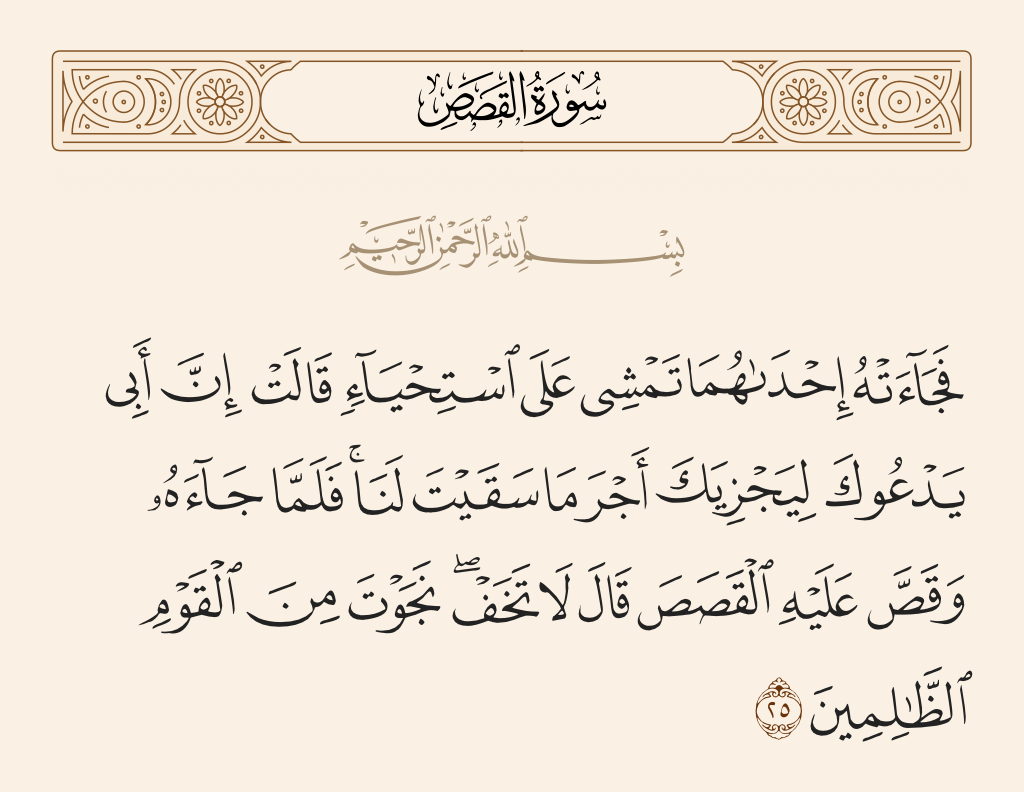Surat Al-Qasas Verse No. 25: Reading and listening
Translation of the verse 25 from Surah Al-Qasas : Number of verses 88 - - page 388 - Part 20.

﴾فَجَآءَتۡهُ إِحۡدَىٰهُمَا تَمۡشِي عَلَى ٱسۡتِحۡيَآءٖ قَالَتۡ إِنَّ أَبِي يَدۡعُوكَ لِيَجۡزِيَكَ أَجۡرَ مَا سَقَيۡتَ لَنَاۚ فَلَمَّا جَآءَهُۥ وَقَصَّ عَلَيۡهِ ٱلۡقَصَصَ قَالَ لَا تَخَفۡۖ نَجَوۡتَ مِنَ ٱلۡقَوۡمِ ٱلظَّٰلِمِينَ ﴿
[ القصص: 25]
Then there came to him one of the two women, walking shyly. She said: "Verily, my father calls you that he may reward you for having watered (our flocks) for us." So when he came to him and narrated the story, he said: "Fear you not. You have escaped from the people who are Zalimun (polytheists, disbelievers, and wrong-doers)."
English - Sahih International
Then one of the two women came to him walking with shyness. She said, "Indeed, my father invites you that he may reward you for having watered for us." So when he came to him and related to him the story, he said, "Fear not. You have escaped from the wrongdoing people."
Tafheem-ul-Quran by Syed Abu-al-A'la Maududi
(28:25) (Not long afterwards) one of the two women came bashfully towards him, *35 and said, "My father calls you so that he may reward you for watering our animals for us." *36 When Moses went to him and narrated to him his whole story he said, "Have no fear for you have now escaped from the wicked people."
Tafheem-ul-Quran by Syed Abu-al-A'la Maududi
*35) Hadrat `Umar has explained this sentence, thus: "She came walking modestly, with her face covered with a part of her outer garment, unlike those immodest women, who go about wherever they like, and enter wherever they like without any hesitation." Several traditions bearing on this subject have been reported by Said bin Mansur, Ibn Jarir, Ibn Abi Hatim-and Ibn al-Mundhir from Hadrat 'Umar through authentic chains of athorities. This shows that the Islamic concept of modesty which the Companions of the Holy Prophet had understood from the Qur'an and the teaching and training of the Holy Prophet was absolutely opposed to keeping the face exposed to the other then and moving about immodestly. outside the house. hadrat `Umar has clearly regarded covering of the face as a symbol of modesty and exposing it to the other men as an immodesty and shamelessness.
*36) She said this also out of modesty, for she had to give a sound reason for her coming to another man all alone; otherwise it was not at all necessary that a gentleman should have been rewarded if he had rendered some service to the (helpless) women in trouble. And then, in spite of hearing of a reward, the Prophet Moses' willingness to follow her forthwith to her house indicates the state of extreme helplessness in which he found himself at that time. He had left Egypt empty-handed and might have taken at least eight days to reach Midian. He must be hungry and worn out by journey. And, above all, he must be anxious to find a shelter in the unfamiliar land and a sympathetic person to give him refuge. Under this very compulsion, in spite of hearing that he was being called to be rewarded for a small service he had rendered, the Prophet Moses felt no hesitation in going with the woman. He must have thought that the prayer he had just made to God was being answered thus by God Himself. Therefore, he did not think it was right to turn down the means of hospitality provided by his Lord by an unnecessary show of self-respect.